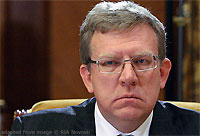Anti-western rhetoric stopped international financial center in Russia – Kudrin

MOSCOW. Dec 18 (Interfax) – Anti-western rhetoric has stopped the establishment of an International Financial Center (IFC) in Russia, former finance minister and now chairman of the Civil Initiatives Committee, Alexei Kudrin, said.
Instead of dialogue between the authorities and the public, legislation is being passed that is hitting protestors. One myth is the assertion that almost all civil activity in Russia is inspired and financed from abroad.
“This is far from the truth and ignores the real problems that need to be focused on and in terms of the economy creates new risks for our country. Anti-western rhetoric, innovations in legislations on treason and other matters are creating unfavorable conditions for foreign specialists and companies in Russia,” Kudrin said at an Interfax press conference Tuesday.
“This certainly does not encourage the idea of an International Financial Center in Moscow. And the scale of this rhetoric, I think, has already stopped the establishment of an International Financial Center,” he added.
One the one hand plans are announced about improving living and working conditions for foreign specialists in Russia and plan sto make Moscow a settlement center for international financial organizations. However, on the other, complete distrust and suspicion is demonstrated toward foreign citizens and companies, the former minister said.
We need to make working conditions for foreign citizens in Russia comfortable, Kudrin said. “I support the idea of an IFC in Moscow and consider it is possible. If we wanted to go ahead then everything could take place,” he said.
The former minister also said that instead of planned privatization Russia was seeing the reverse process of nationalization. “Despite the announced aims to privatize, de-privatization is creeping in,” he said, adding that a clear example of this reverse process was the Rosneft purchase of TNK-BP (RTS: TNBP).
Over $53 billion is to be spent on this deal, he said. If we take into account the non-cash component – BP obtaining shares in Rosneft (RTS: ROSN) – then the “net balance on the side of nationalization” is around $40 billion. “That significantly exceeds the government’s privatization plans. In fact the movement is in the opposite direction,” Kudrin said.
Kudrin also criticized pension reforms in Russia. “The announced pension system reform, of course, reduces the stability of the country’s financial system in the long-term and, of course, reduces future pensions,” he said.
Reducing from 6% to 2% the cumulative part of the pension will considerably reduce the volume of savings in the economy, which are a basis for investment. “Measures have been adopted that lower the modernization opportunities for our country,” he said.
Kudrin said one of the achievements of 2012 was Russia’s accession to the WTO.
The former minister said there are still serious risks in the global economy that require more active structural reforms in Russia and support for a strong financial system. Carrying out all the plans announced are simply a must and there should be a more balanced approach to reforms in the pensions system, social welfare and in creating infrastructure is needed, he said. The “budget regulation” absolutely must be maintained.
The situation in Europe remains a risk for the global community and Russia, he said. “The risk of a crisis scenario next year remains and my forecast is that Europe, especially the euro zone, will fall into recession again next year,” Kudrin said. If GDP goes down in Europe the financial recovery plans for Greece, Spain and Italy will be in jeopardy. “This indicates an increase in risks next year, including for our country,” he added.
